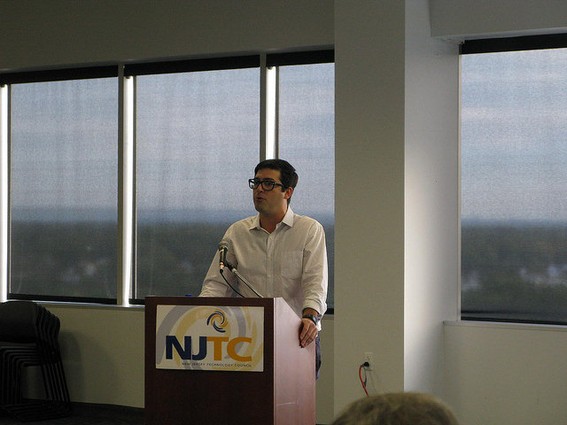Technology Execs Learn About Bitcoin at New Jersey Tech Council Leadership Summit

David Kinitsky, senior director at SecondMarket and general manager of the Bitcoin Investment Trust, delivered the keynote speech at this year’s New Jersey Technology Council Leadership Summit, on October 7.
The summit, which took place at EisnerAmper‘s conference center in Iselin, was organized to let C-level executives share and learn from each other’s experiences while discussing the unique challenges facing business leaders in their position.
Kinitsky’s speech informed the audience about Bitcoin, which he said was both a global transaction network and a digital currency. He added that, “more specifically, it’s an open-source software protocol with an associated unit of value.” The network and protocol are referred to with an uppercase “B,” while the currency is referred to with a lowercase “b.”
Kinitsky said that there is debate over whether the digital currency will “stand the test of time” as a form of money. “However,” he added, “there is pretty broad consensus that Bitcoin or something like Bitcoin could fundamentally revolutionize transaction systems [and] financial networks across the world,” just as open-source internet protocol did about 30 years ago.
Bitcoin is characterized by being “decentralized,” like an open-source software project, Kinitsky said. Rather than being controlled by any government, Bitcoin operates through a public ledger system. Contributors on a lean development team manage bug fixes and other updates, while peer-to-peer transfers occur without a third-party intermediary, such as a bank.
“We’ve never seen what money can do,” so Bitcoin is a kind of experiment, Kinitsky said. “I do want to stress that we are in the experimental phase. Though I am avidly working on it because I’m excited about it and the prospects of it, I understand that we’re in the first inning of a nine-inning game.”
“We like to think about it in five stages,” Kinitsky explained. The first stage was the initial release in 2009, during which hackers worked on Bitcoin because they thought it was interesting. The second stage, which took place from 2010 to 2011, saw early adopters using it as currency.
Stage three, which Kinitsky believes to be the current stage, involves serial entrepreneurs and venture capitalists getting involved with Bitcoin. Stage four, the “Wall Street phase,” would involve a growing monetary base supported by increased computing power. The final phase would be mass adoption. “But we’re talking 10, 15, 20 years” in the future, Kinitsky said.
Currently, “you’re starting to see talent from tech firms move from more established players in the market to these early, early-stage Bitcoin companies,” Kinitsky said. For example, Ryan McGeehan, Facebook’s former director of security incident response, and Todd Edebohls, Amazon’s former director of business development and sales, accepted jobs at one of Bitcoin’s “wallets,” Coinbase, this year. Coinbase is a business that allows users to buy, use and receive bitcoins.
Kinitsky said that the brain power currently getting behind Bitcoin is one of the reasons he and others are excited about the currency.
He acknowledged, however, that there are risks involved in this investment. First, he said, the monetary base needs to grow for Bitcoin to become stable and secure. Second, “if someone were to hypothetically have over 51% of the computing power in the system,” that person could hijack it. But “they would have to spend so much money,” the investment would be “worthless” after the hijacker destroyed the system.
Kinitsky also pointed to government regulation as a potential concern for investors. “We’re just now starting to see that get figured out, and it’s really a patchwork across the world as to how countries are dealing with it,” he said.
In the United States, regulatory agencies are starting to get involved, but “they haven’t come down too hard on it,” he explained. However, he added, if Bitcoin were linked to an activity like a terrorist attack, it would be “very problematic,” and he would expect regulation to increase.
Still, Bitcoin wouldn’t be as useful to terrorists as most people think, Kinitsky said. “Everything is recorded on this public ledger, such that a lot of the agencies—the FBI and the CIA, in particular—have said that they think [bitcoins] would actually be easier to track than dollars.”
After his talk, Kinitsky took many questions from the audience. “Bitcoin is always a very well-received topic,” he told NJTechWeekly.com. He added that it’s important for high-level executives to be aware of innovations like Bitcoin, “and how they can be competitive threats to your business, or opportunities for your business.”
Indeed, there are a lot of opportunities, according to Kinitsky. “The inflow of talent, specifically in the technology space, flowing into the Bitcoin area is huge,” he said. “Some of the funding is starting to come together, and the community—an ecosystem—is growing too, so it’s actually an incredible time to do something.”

